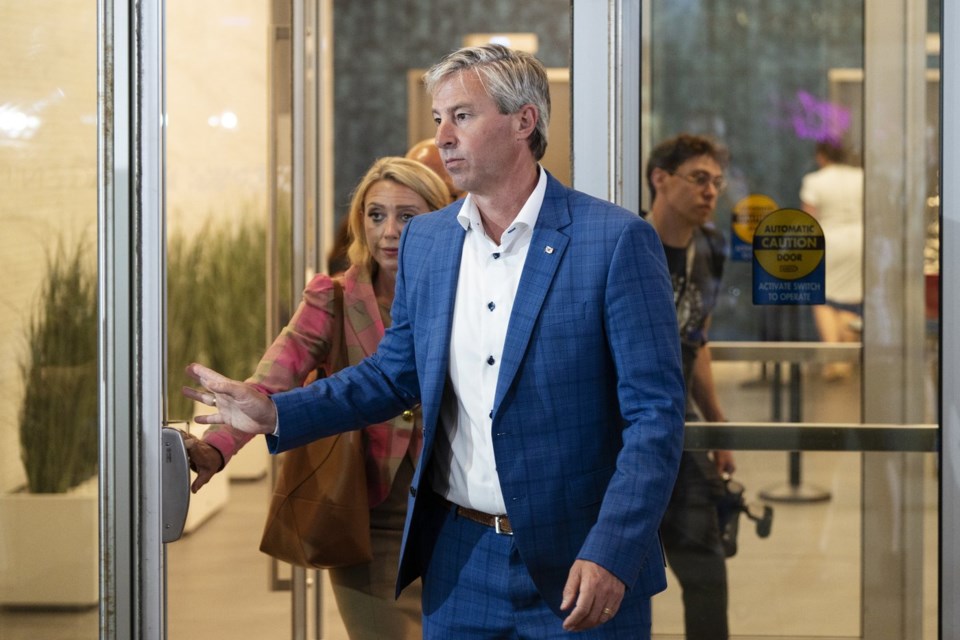HALIFAX — Nova Scotia’s premier doubled down Friday on his position that he will not accept any attempt by Ottawa to resettle thousands of asylum seekers in the province.
In a statement issued by his office, Houston said the federal government wants to send nearly 6,000 asylum seekers to Nova Scotia, something he called “simply unacceptable.”
He also repeated what he told reporters on Thursday — that Nova Scotia is focused on its plan for population growth and doesn’t have the capacity to accept that many would-be refugees.
“We have communicated to Prime Minister Justin Trudeau’s cabinet that any attempt to ship asylum seekers to Nova Scotia will be challenged,” the premier said, although he wasn’t specific on what that meant.
Houston called on the federal government to “drop the idea.”
“Let us focus on our … plan that is attracting the professionals, like doctors and nurses, our province needs,” the premier said.
The governments of New Brunswick, Alberta and Saskatchewan have also pushed back against what they said was the federal government's plan to force them to accept thousands of people seeking asylum in the country. But on Thursday federal Immigration Minister Marc Miller made it clear there is no plan to impose asylum seekers without compensation or the consent of premiers.
"We at no time have said that we would impose asylum seekers on provinces without financial compensation," Miller said. He added that any numbers that have been floated in public are “aspirational” and based on models that reflect each province’s population.
Ottawa has been under immense pressure from Quebec to reduce the number of temporary immigrants in the province, especially asylum seekers.
Premier François Legault has said that in the last two years, the number of temporary immigrants in Quebec has doubled to 600,000 from 300,000. Ontario has also called on the federal government for help, citing the disproportionate number of would-be refugees in that province.
On Friday, Legault said discussions with provinces on redistributing asylum seekers are going "nowhere."
Speaking at an aerospace announcement near Montreal alongside Prime Minister Justin Trudeau, Legault reiterated his request for the prime minister to cut in half the number of would-be refugees in Quebec.
"We have been talking for six months, there have been no results, and when I have discussions with the premiers of the other provinces, it seems to be going nowhere," Legault said.
Trudeau winced when Legault said there had been no progress in the negotiations over Quebec's demand to resettle refugees.
"It’s a question of fairness across the country to make sure that everyone does their fair share and these are ongoing conversations," Trudeau said.
Houston’s statement was contrasted by a seemingly more conciliatory tone set by his immigration minister earlier Friday. Jill Balser told reporters that she has had no conversation with the federal government on any specific number of asylum seekers and that talks between Ottawa and the provinces are continuing.
Balser said Nova Scotia wanted to be a collaborative partner but would need resources and financial support from the federal government if it were to accept a number of asylum seekers. The minister said that she was hopeful there could be a “positive conversation” with Ottawa because there are people who are fleeing “unimaginable circumstances.”
“We know that Nova Scotia has seen asylum seekers arrive in the past, those numbers are more in line with about 200,” Balser said.
When asked how many more the province could take in, Balser was noncommittal. “I think that’s the question that we have to ask and this is the one we are looking at internally,” she said.
Zach Churchill, the Opposition Liberal leader, called the premier’s stance “hypocritical” given Houston's stated goal of wanting to double the province’s population to two million by 2060.
“Now he’s saying if people are coming here because they are fleeing war or persecution that they are not welcome, and he’s assuming that asylum seekers don’t have skills that we can use here,” Churchill said.
This report by The Canadian Press was first published Sept. 13, 2024.
— With files from Morgan Lowrie in Montreal
Keith Doucette, The Canadian Press


